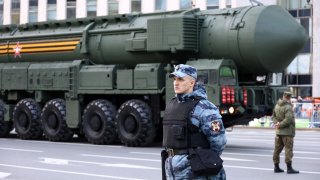Putin’s Tactical Nuclear Exercises: Old Wine in New Bottles?
The war in Ukraine and other disagreements between Washington and Moscow have put nuclear arms control on the back burner. Nevertheless, it is in the interest of Russia and the United States to restart New START discussions at the level of engaged experts, even if they stay below high politics.
Yet, in the absence of the inspection protocols required for verification of the agreement, neither side can have full confidence in the status of the other’s forces. The war in Ukraine and other disagreements between Washington and Moscow have put nuclear arms control on the back burner, and the upcoming presidential election in the United States has added to the immediate distractions. Nevertheless, it is in the interest of Russia and the United States to restart New START discussions at the level of engaged experts, even if they stay below high politics. Continuing exchanges between military and nuclear arms control experts can clarify assumptions about the options for renewing high-level engagement of political leaders once favorable or permissive winds reappear. Ongoing expert talks also contribute to understanding on both sides about where nuclear modernization fits into their larger views of national and military strategy. One may disagree with how the other side thinks, but you need to understand how and why it does so.
At this point, including Chinese participants in expert discussions would be useful. Although voluntarily sharing details about active or planned military modernization and deployment would be a big step for China, engaging with the United States and Russia in a trilateral forum could help clarify Chinese, compared to Russian and American, concepts of military strategy and foreign policy with respect to nuclear issues. U.S. government assessments have projected that China may deploy as many as 1,500 nuclear warheads on long-range delivery systems by 2035, bringing it to near parity with the United States and Russia. If so, a two-sided New START regime would need to be superseded by a trilateral agreement with some flexibility for transparency and monitoring, including some creative approaches to on-site inspection or its equivalent. If that sounds like a squeaky regime, one should consider the power that modern U.S. and allied intelligence systems have for unilateral monitoring of adversary deployments and nuclear modernizations. Fine points may be missed, but elaborate nuclear infrastructure and large numbers of launch systems and weapons are difficult to hide from prying eyes.
Other U.S.–Russian arms control issues that merit attention include: (1) the status of non-strategic nuclear weapons in NATO-territory and Russia, including improved transparency about procedures for storing, moving, and mating weapons with assigned launchers; (2) a reboot of the Intermediate Nuclear Forces (INF) Treaty or some update of it, at least for Europe, in order to eliminate ballistic and cruise missiles that are nuclear-capable and have ranges between 500 and 5,500 kilometers (admittedly this will be difficult due to the increasing numbers of ballistic missiles being deployed by nations worldwide, but different regions call for different solutions); (3) some agreed-upon protocols for military competition in space, with spacefaring nations in addition to the United States and Russia included; (4) shared understandings about offensive and defensive cyberwar, including cyberattacks directed against vital military and infrastructure targets; and (5) more U.S. and Russian support for a stronger nuclear non-proliferation regime, and cooperation in dealing with threshold nuclear powers and nuclear rogue actors.
About the Authors
Stephen J. Cimbala is a distinguished professor of political science at Penn State Brandywine and the author of numerous books and articles on international security studies, defense policy, nuclear weapons and arms control, intelligence, and other fields. View a listing of Dr. Cimbala's authored books, book chapters, and journal articles here.
Lawrence J. Korb is a senior fellow at American Progress and an adjunct professor at Georgetown University. He was previously a senior fellow and director of national security studies at the Council on Foreign Relations. Follow him on X: @LarryKorb.
Image: Oleg Elkov / Shutterstock.com

